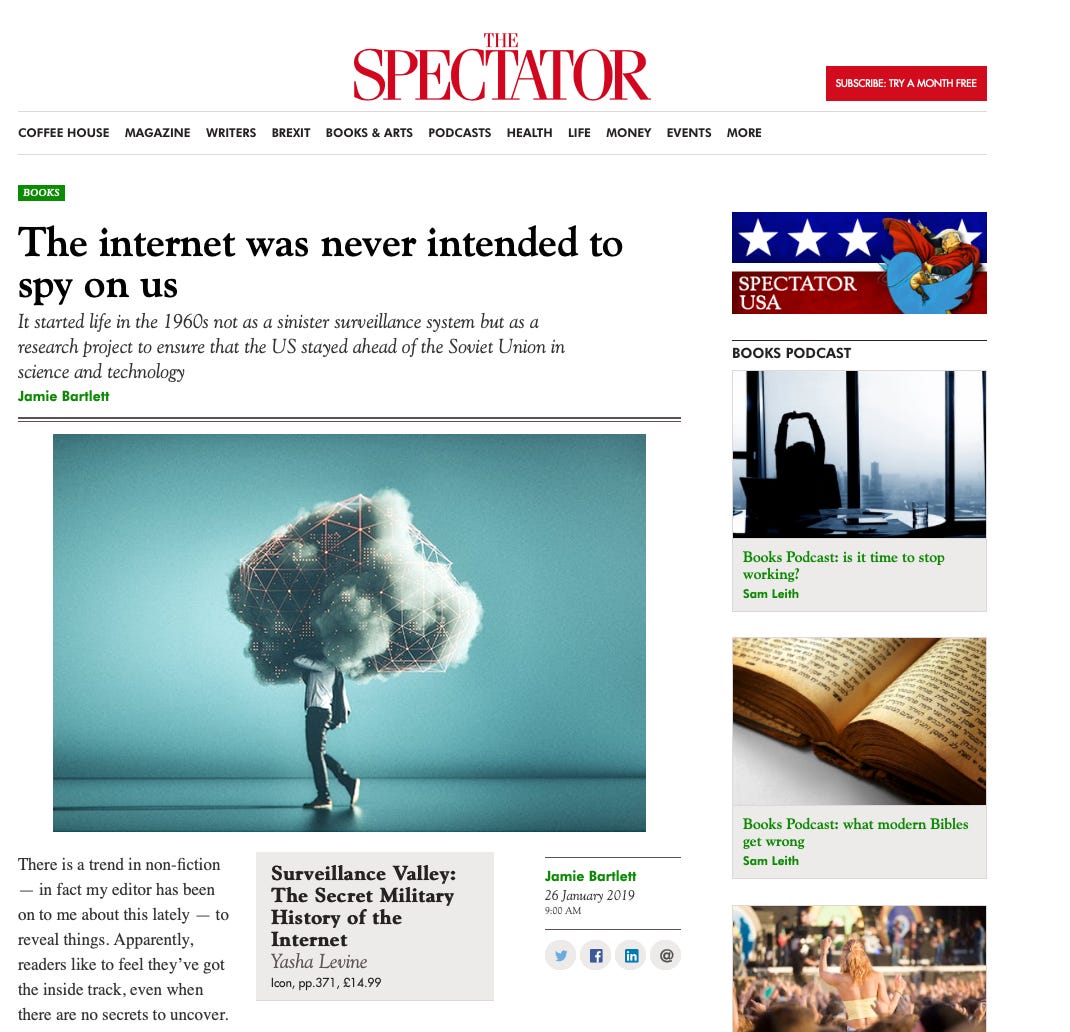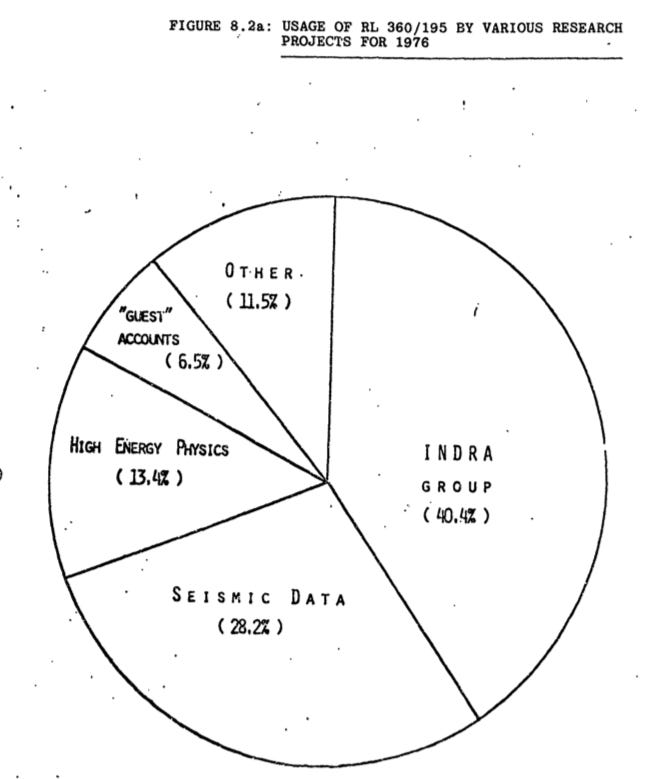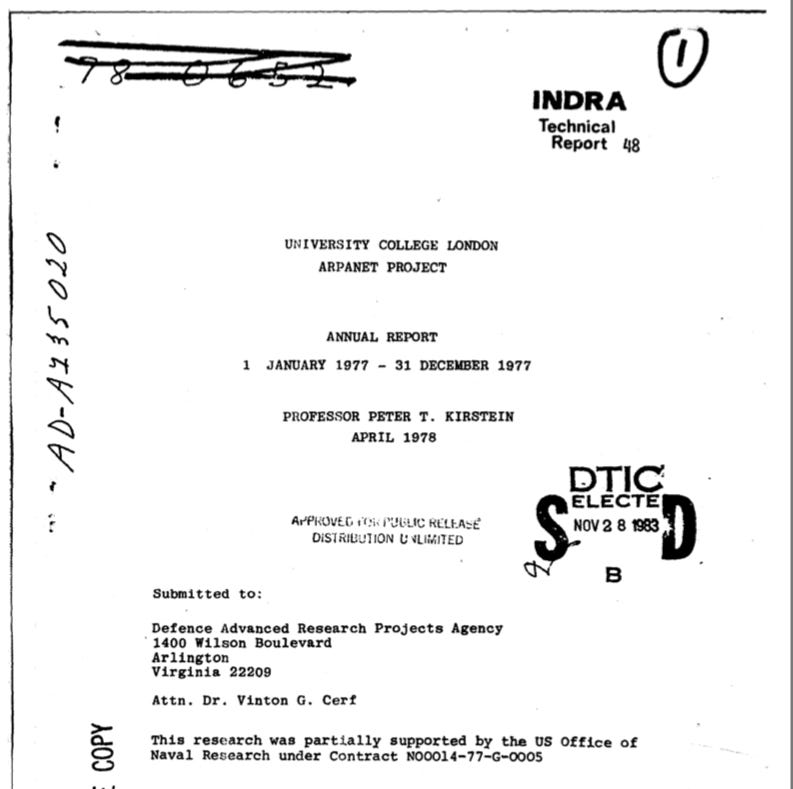Yes, the internet was always intended to spy on us.
Elon Musk’s Billionaire Nerd Revenge continues unabated.
He continues, through his legal department, to keep Twitter’s email vaults open. His rationale has been very transparent from the start. Having been mocked and attacked by Twitter’s liberal-adjacent managerial class, he’s thrown open the books to a few trusty-and-tested influencer types who he can count on to stay on message. And the message is: show the corruption and hypocrisy and downright evilness of the libs. They hate free speech! They work with spies, despite being Democrats! Can you believe it?
While there’s some historical utility to the stuff that’s being dragged out of what’s usually a NDA’d corporate black hole, confirming in some specifics what everyone already assumed or generally knew was going on with these platforms, there’s nothing very deep about the conflict. It’s not like Musk opposes to the U.S. military or is against the use of private communication platforms to suppress speech. I mean, he now owns one such platform and he is also a security state billionaire — a deep state business man who draws hundreds of millions in rocket and spy and communication satellite contracts. He helps the U.S. kill people — aka put warheads on foreheads.
So there’s no larger disagreement here. Just superficial bickering, a clan vs. clan fight. Kinda reminds me of what was happening back in the day here in San Francisco among the various media/mining oligarch clans — the Hearst fam vs the de Young fam vs the Spreckels fam. They used their newspapers to sling mud and blackmail each other, and to expose each other’s corrupt deals and schemes. But for what? It was entertaining to San Francisco readers, that’s for sure. But it changed little in terms of what the oligarchic class did to California: strip-mined the land, destroyed rivers, denuded forests, worked people to death in the mines…
Anyway, all this talk about the Internet and spying and the military has made me nostalgic for my Surveillance Valley days. I was looking through my old blog entries and came across something I wrote almost three years ago: an anecdote about military surveillance from the earliest days of the internet. All these Musk fans are suddenly so shocked that the place is filled with spies. But it always has been.
—Yasha Levine
No, you're wrong. The internet was always intended to spy on us.
Yasha Levine • Feb 02, 2019
Yes, it was.
The Spectator just ran a review of Surveillance Valley that tried to debunk my book as conspiratorial and to show, contra to my thesis, that: No…“The internet was never intended to spy on us.”
The funny thing is that very expert testimony the reviewer tries to use against me, on closer examination, actually proves me more right than ever. Yes, more right. Hard to believe that it’s possible to be even more right than I was before. But such is the nature of this bungled review.
To debunk my claims about the Internet being a surveillance technology from the very beginning, the reviewer — journalist Jamie Bartlett, who’s written a number of books about the Internet and even hosted a decent BBC program about nutty techno-libertarians — decided to appeal to authority. He phoned a guy who had worked on an important ARPANET node in the 1970s at the University College, London. This was one of first two foreign connections to the ARPANET, the Pentagon network that was later privatized and grew into the global Internet that we all use today.
This expert, a networking engineer who indeed "was there" — professor Peter Kirstein — told Bartlett in very definite terms: Yeah, Yasha's totally wrong. There was no military surveillance happening on the early Internet. None at all. “Unless everyone’s been lying to me for 40 years, the ARPANET was not intended as, or used as, a surveillance system,” he said.
With that established from an expert — a person known in some rarified circles as "the father of the European Internet" — Bartlett then moves to chide my paranoid leftism and scolds my inability to trust in the noble intentions of the Internet’s Founding Fathers: “There’s a softly conspiratorial view of the world which sees anything funded by government as corrupt or menacing," he explains. "Throughout, Levine has too much faith in the US government’s power of foresight, and too little in engineers such as Vint Cerf."
Yes, why can't I just implicitly trust the military contractors who built the Internet for the Pentagon? Why can't I take them at their word? What's wrong with me?
Actually, professor Kirstein is the perfect example of why the self-guided history of the Internet offered by "experts" who "were there" and "know best" should always be checked and double checked.
See, what professor Kirstein didn't tell Bartlett — and what Bartlett himself clearly does not know anything about — is that the entire reason the UK ARPANET node existed back then was because it was used as a data link for a covert anti-Soviet surveillance program — a program that attempted to detect underground Soviet nuke tests by monitoring seismic vibrations from Norway and other spots around the world, and then sent that data to America for processing and analysis.
This ARPANET-connected surveillance program was designed to look like an academic earthquake monitoring service — a cover that masked its intelligence purpose. Naturally Vint Cerf, the Founding Father of the Internet/ARPANET contractor who Bartlett says I'm supposed to implicitly trust, was involved with this nuke surveillance project from the very start. (As I explain in my book, Cerf had done a lot of classified work for the military. Yet today he enjoys wide acclaim as visionary techno-radical, all while collecting fat paychecks as a celebrity lobbyist for Google. His official title: "Chief Internet Evangelist for Google.")
Years ago, Matt Novak dug into this ARPANET Soviet nuke surveillance program and here's what he found:
A Norwegian military research agency partnered with ARPA for an expansive seismic monitoring program called NORSAR, which also included monitoring stations in Alaska and Montana. As Olav Riste explains in his 2014 book on the history of the Norwegian intelligence community, there were 22 NORSAR stations set up by ARPA and the Norwegian Defence Research Establishment (roughly Norway’s equivalent to DARPA) in the southern and eastern parts of Norway. By June of 1973 all of those stations were feeding information to the American intelligence community through a satellite link to the ARPANET.
As researcher Olav Njolstad wrote in his 2007 paper Atomic Intelligence in Norway During the Cold War, NORSAR was supposed to look like a non-military earthquake monitoring service, which it also was. But, of course, its primary mission was firmly rooted in intelligence gathering.
"Despite its civilian clothing, NORSAR was a child of US-Norwegian military intelligence cooperation. Indeed, the director of the Norwegian Defence Research Establishment supervised its construction in person, and the advanced computer centre that would provide the realtime link to ARPANET was placed just outside the barbed wire fences of his institute."
This data flow from this surveillance array in Norway changed a few times, and the details are somewhat convoluted. But ultimately the UK ARPANET node that Professor Kirstein was in charge of was part of this program, and a big part of what it did was forward seismic surveillance data to American intelligence agencies — seismic surveillance meant to track Soviet nuclear tests.
Here's a nice chart that Kirstein provided to ARPA of computer usage at his ARPANET node in a 1978 status report (addressed to Vint Cerf):
I looked at it a bit more deeply and, as it turns out, Kirstein himself admitted in a 2015 oral history that his work with ARPA was a part of a larger project to spy on Soviet nuclear tests:
"Back when I started ARPANET work at the Institute of Computer Science in London — this was somewhere around 1970/71 — I tried to get the Science Research Council to back what I was doing, because DARPA [the US military’s research division] had a link that they were putting into Norway for seismic monitoring for their nuclear monitoring research operation...I knew these people very well, and I was offered the link."
Ooops. Looks like prof Kirstein of 1978/2015 disagrees with prof Kirstein of 2018. Turns out that there was military surveillance happening on the ARPANET. Yasha's been right all along! Too bad he didn't let Jamie Bartlett in on the secret.
The most important thing here, though, is that this bungled review ended up proving Surveillance Valley even more right:
Whatever non-military academic and research work that happened on the network — and there obviously was some — the ARPANET was created and used as surveillance technology from the very beginning. And no amount of clinging to the free and open origin myths of the Internet will change that.
Want to know more?





I support your work Yasha..I am going to buy your book when I can figure out how to buy it (given that I live half way around the world from you in India and don't use Amazon)..Amazon also bought up AbeBooks at some point.
I found Shoshana Zuboff's "The Age of Surveillance Capitalism" an eye-opening (though depressing) read and expect to find yours similarly enlightening and depressing (a common theme with these sorts of things).
Loved your Baffler article on astroturf groups like the EFF. I always feel dubious about groups like that but there appear to be no non-astroturf privacy groups out there. Privacy International is fairly respectable as far as I can tell, but feel free to correct me..
Your book opened many doors long before others. The others later released mainstream documentaries and other hits on the deep rooted evil of "everything is spying on us can you believe it". Later this evolved into "sure they're spying on you but they're doing it for your best interests". Now that everyting was always spying on us we need to shepard the spys into spying for our interests alone. So it's been said.
I got your book on it's release and regrettably since spilled coffee on it's back side. I'm sorry!